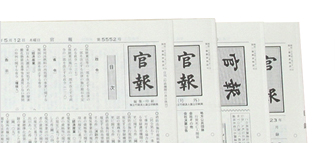|
English language portals |
Japanese language portals |
|
Japan External Trade Organization (JETRO) Government Procurement Information Website |

|
English language portals |
Japanese language portals |
|
Japan External Trade Organization (JETRO) Government Procurement Information Website |
Governments require a vast array of goods and services, to perform their duties, which makes it difficult to give a specific indication for specific products. Foreign companies are currently primarily active in the following sectors (value-based), but still have relatively small shares:
There are only a few comprehensive statistics available about public procurement in Japan, to obtain a good overview about how and where Japanese government institutions spend their money. Although various statistics can be found, they are difficult to compare as often different thresholds are applied when compiling the statistics. On this page you will find a selection of statistical resources regarding public procurement in Japan.
Reports by the Japanese government to WTO
The framework of laws, ordinances and regulations regulating Government Procurement is one of high complexity, involving dozens of legal texts. Procurement by national entities is subject to the Accounts Law; on the other hand procurement by local government falls under the Local Autonomy Law. This has resulted in the development of two separate legal structures government procurement.
Japan signed up to the World Trade Organisation Agreement on Public Procurement (GPA) in 1994, to create better opportunities for foreign companies in the signees’ respective countries. Concretely this means that country who joined the GPA take measures to ensure fair and equal treatment of suppliers irrespective of whether they are a domestically based company or based in one of the other signees’ countries.
Type of procedure | Occurrence | Tender size |
Common | Any | |
Rare | Any |

The Japanese public procurement (PP) market is one of huge potential, with EU-estimates ranging from EUR 550 billion to EUR 565 billion. EU-companies are relatively underrepresented in the PP-market in Japan, partly due to non-regulatory barriers and the geographical distance and lack of knowledge of the market. EU companies that are presently active in this market are primarily larger global players, with a sizeable presence in Japan.
QuestionWe are in Japan for business activities, companies that are providing us with services charge us Consumption Tax. Can we get a refund of the Consumption Tax paid in Japan? |
AnswerYou can only receive a return of Consumption Tax paid in Japan, if you have taxable sales within Japan with in a base period. |
For foreign companies, the competent tax office is the location of the main permanent establishment in Japan.
The National Tax Agency , an external organ of the Ministry of Finance, is in charge of the assessment and collection of internal taxes. It supervises 12 Regional Taxation Bureaus throughout Japan, under which 524 local tax offices are set up to execute tax administration. (NTA)
Similar to many other countries, Japan charges penalties for any delay in the payment or the filing of the tax returns.
Japanese tax system offers a wide range of possibilities to pay taxes:
The annual filing of the corporate tax return has to be done within 2 months of the last day of the fiscal year at the taxation office where the company has its registered business address. The final financial figures with regard to the corporate earnings and the taxable amounts need to be correctly calculated and require the approval from the majority of the votes casted at the general meeting of the shareholders of the company.
The EU-Japan Centre currently produces 5 newsletters :









